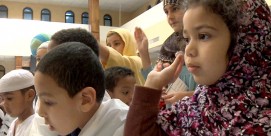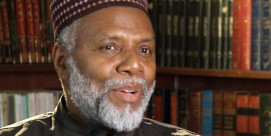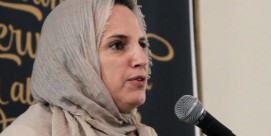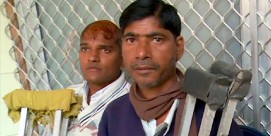In This Episode << SLIDE LEFT TO SEE ADDITIONAL SEGMENTS
Muslims and Charity Interview Anwar Khan
Read more of Kim Lawton’s interview about Muslims and charity with Anwar Khan, national development director of Islamic Relief
Q: What is the mission of Islamic Relief?
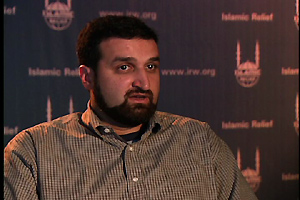 A: It’s to make this world a better place. To help those who are impoverished get up on their feet. To be able to bring people together from different backgrounds.
A: It’s to make this world a better place. To help those who are impoverished get up on their feet. To be able to bring people together from different backgrounds.
Q: How do you try to do that?
A: We work here in the U.S. with people of different faiths to help raise awareness and raise funds for people in need here in the U.S. and overseas. We don’t want to just talk about unity. We want to practice unity, so we go to places that are in real need. As you know, in some countries 1 in 4 children die before they reach their 5th birthday. In other countries, the average age is 44 years. So we go to those areas, wherever they be, in Africa, whether they be in Asia, wherever they’re in need, and we try to help them, and over there we work through a system of volunteers. So here we raise the money through a network of volunteers. Most of our manpower here are volunteers. We then transfer the funds to Islamic Relief partners overseas. They then work through volunteers in the affected area. And we work with people of different colors, of different religions, of different ethnicities–together. One example is when we worked in India. We worked in the south of India, and our name is Islamic Relief, so we went there and we built a water well. Some of the local Hindus from lower castes, the untouchables, came to us and asked us, “Can we drink from the water well or is it only for Muslims?” First, we were surprised by the question. It didn’t occur to us that anyone would ask us, “Can I use your water?” I said, “Of course. Water is for everybody.” But then we found out that there were issues in the area about certain groups were not allowed to drink water from the water well, and we said, “This is not for Muslims, this is for everybody.” In the south of Sudan, we’re working in areas which are predominantly Christian, and our staff is Christian. So you have Christian Islamic Relief staff working with the Christian community. When they look at the Muslim faith they don’t look at it as just people trying to push people into their faith. They look at us the way we want everyone to look at each other, which is we’re all here to help humanity. If we go to sleep tonight and we haven’t made this world a better place by helping somebody, we’ve wasted our day. This is true in Islam, Christianity, Judaism, Hinduism, Buddhism–all of the faiths in the world. So in Islam we treat others the way that we would like them to treat us. This is the Golden Rule. So here in Islamic Relief we’re actually putting this into action. Our people are risking their lives to deliver aid. We are working together with people of diverse communities here to help people of diverse communities over there.
Q: How does Islamic Relief decide which projects it takes on?
A: Here in the U.S., it depends where we have local partners. For example, in South Central LA, we have a local partner. In Louisiana, we have our own office over there. So here in the U.S. it depends where we have our offices and where we have local partners. Overseas, we work with international partners, the same way you have the American Red Cross. The same way you have, for example, the British Red Cross or the Lebanese Red Cross. They coordinate with each other. We coordinate with the different Islamic Relief partners, and they’re in Europe, Asia, and Africa. So if we have local partners there, we work through them. If we don’t, then we find in certain areas, for example Congo, we work through one of the Catholic charities in that area and in El Salvador. So we will work with different partners that we trust in that area. We have some agreements with different international organizations, so when there’s a crisis we work with them. For example, Catholic Overseas Aid for Development–that’s from Europe. They have an understanding that if there’s a crisis in a Muslim country, and we have an office, they help us out. If there’s a crisis in a Catholic country and they have a problem, we work through them. So we give the money and they do the work over there and vice versa.
Q: And there’s a project you’re working on with the U.S. government in Burkina Faso?
A: Yes. We received general assistance from the U.S. government to help with the transportation cost of supplies that we’re supplying over there, and we’ve done this in the past. The U.S. government, the U.S. military, has helped to pay for the costs of transport for shipments, so we work with local friends and partners here. And I think the shipments are coming from non-Muslim friends, some of them from churches and other areas, so we get the supplies from them. We get assistance from the U.S. government to ship it over there, and then we work with our local partners and our staff in Africa to deliver the aid.
Q: Can it be a difficult thing on the ground to have some of these partners? For example, there are places where the U.S. government isn’t necessarily the best partner sometimes. Is that an issue for you?
A: It depends where and when. Some of our staff have died delivering aid, and that’s a part of working in conflict zones. We don’t want to do anything that endangers our staff’s lives. So in certain areas we will work just through Islamic Relief. In other areas we will work with different partners. So it really depends on the security situation in the area.
Q: Tell me about the religious motivations for this work. What is the faith element in this? Why is it important to have the word “Islamic” in the organization title?
A: I was asked the same question in a press conference in Karachi last week. They asked me, “But you’re a humanitarian organization. That’s what it sounds like.” They came to the press conference thinking it was a religious organization only to find out we were doing humanitarian work. And this is in Pakistan, which is a Muslim country. And I was a little bit surprised that people even asked that question, because you see to me Islam is a religion of peace and mercy. When I watch TV people say, “I’m fed up hearing Islam means peace,” and it does. The translation means peace through submission to the will of God. And people are saying, “I’m for that.” No, it really means that to me. To me, the part of Islam that I understood was when we start anything we say “In the name of Allah, most merciful, most compassionate.” So to us, mercy and compassion are a part of the faith. This is what we follow. The Prophet Muhammad, we were told, was a mercy not to Muslims–to mankind. He loved the orphans. He supported the widows. He helped the needy. So to us the way that you see a Muslim is not by the size of his beard or the clothes. It’s not a fashion statement. It’s a state of mind. It’s helping others to make this world a better place. I believe, as a Muslim, that I’m here to make this world a better place. My Jewish friends, my Christian friends, they will say the same thing. We have different ways of making this world a better place, and I believe that all of the prayers we do, all of the other actions we do of worship are here to be a training for us so we become better people so we can help others, so when I go to places, and I have been to mass graves in Bosnia, I find out that people were thrown like human garbage in the area, that a little baby was buried in a mother’s arms in the area. And you ask yourself why? My faith gives me strength for that time, and I see faith as a way that we can improve the world, improve the humanitarian work. The advantage to me about Islamic Relief is that we can go to areas that other charities can’t go. Catholic charities can go to some areas that we can’t go. Jewish charities can go to areas that we can’t go, but we can go to some areas that they can’t go. So what I believe is that the faith community around the world, if we work together, we can make the world a better place. We see all the time that religion is used as an excuse to harm people. But religion can also be used to bring people together, and this is what I love about the work of Islamic Relief. On my first trip, when I was 22 years of age, I went to Bosnia. I went to areas where no other aid agency in the world was going. Islamic Relief is one of the few aid agencies working in Herzegovina and Chechnya at the moment. We have access to communities that others don’t go. I try to explain this to my Muslim friends, that if you don’t give money to us, there’s nobody else you can give money to. I explain to my non-Muslim friends sometimes we’re the only ones working in that particular area. The reason is because when we use the name “Islam,” some of the Muslim communities, the same ones that might be upset with some of the organizations you mentioned–we start off on a good level of trust just by using that name. And people get amazed. “How can you be Muslim and American?” When I was at an international water convention in Kyoto, Japan a few years ago, the Muslims thought we were all in concentration camps. They thought that all American Muslims are in concentration camps, they’re all being harassed, and there are no freedoms for Muslims in America. This is what they’ve believed, according to their media. When we met the American delegation they were a bit wary of us: “You guys are still open? We thought all you guys were shut down.” They thought all the Muslims charities in America were shut down. So whether it is here in America, whether it is overseas, people have the perception that we don’t have the freedom. As long as we have freedom, we are free to make this world a better place, and that’s what we’re going to do, we’re going to strive towards that. That’s why I came from Europe to America. I just graduated from university to help start Islamic Relief in America. That’s what keeps me here. I have the freedom in America that I don’t have in other parts of the Muslim world as a Muslim. I’m very grateful for that. I have the freedom here to decide to go over there and to risk my life and help people in need. And when they find out that there are American Muslims, their opinion of America improves. You see, many people–it’s not that they don’t like Americans. They don’t like American government policy. But I told them there are many people here that have the same opinion. So what we’re trying to do is bring people together from different backgrounds so we can see each other for who we are, not for what our governments are. Not for just what our religious leaders or leaderships say. We want it to be one on one. And when they see that, I believe the opinion that people have of America improves, and opinion they have of Muslims over here improves when people find out.
Q: How important is the principle of zakat in Islam?
A: The best translation of zakat is the tithe. Like in many of the churches you have to give a certain percentage of your income to the church–the zakat is a tithe. It’s an obligation to give back to God. But you’re not giving just to him, you’re giving actually to the needy. So there are seven categories of people who are eligible for zakat, so it’s not a normal form of giving. It’s a specialized form of giving that you don’t decide. It’s already been decided–seven categories, whether they be widows, orphans, the needy, and others, and you help them out. So if, for example, you want to give to a mosque, that’s not covered in the seven categories. That you have to give as a donation which is called sadaqah. Sadaqah is charity. Zakat is a tithe. The tithe is 2.5% of your assets over a certain amount that you haven’t used for a year. So it’s extra money. It’s not on your house, it’s not on your car, but it might be on your second house. So it’s basically–the concept is to purify your wealth, that if you get money, and if you have enough just to survive, that’s great. But if you have more than that, the concept is to share money. We don’t believe in the concept of sitting on money and its just increasing. You have to work for your money. So one way is in zakat–that you are forced every year to give to those that are less fortunate. The other way is when people die the inheritance is split between the children. So you don’t get the concept of the eldest son, the eldest child getting all the money and the rest getting nothing. So we want people all the time to work for what they have and to spread the wealth around. So the concept of zakat is to spread the wealth around to those in need. But people ignore the importance of sadaqah. Sadaqah is voluntary giving that anybody at any time can give. So we want people to give the zakat, but we also want people to give their sadaqah, and there are different types of sadaqah, which is charity. There’s a one-time giving and there’s a sadaqah jariah, which is a particular kind of giving which is helping people in future generations. For example, if you build a school, that’s a service to the community. Long after you die, you will still get the blessings and reward of that form of charity–building a water well–because we believe that when we die as Muslims, all of our sins stop. However, if we do a good action, and we aspire to do good actions, we’re still increasing in our blessings. So our concept of zakat is it is a pillar of faith. There are five pillars of faith. Zakat is one of them. Pray in Arabic is salat. Salat and zakat rhyme. The Qur’an has beautiful poetry, and there’s a lot of rhyming. The reason they rhyme is they’re in the same sentence again and again and again. So if you believe in prayer, if you believe in Islam, you must believe in zakat. You must believe in helping those in need, and then on top of that, we encourage people to give more. Many of our donors, they do not give 2.5% only in zakat. Many of them give more in their donations. And that may be to a mosque, that may be to a school, that may be to other forms of charity that aren’t covered in zakat.
Q: Do you think people realize how important that is, that it’s one of the basic tenets of Islam?
A: People know, but we’re trying to educate people. There’s a bit of confusion. As people come from different parts of the Muslim world, you’ve got to remember in many Muslim countries they don’t have to calculate the zakat. The government automatically takes it out of the bank account. This is in the case of Pakistan. If you have money that is entitled, the government will automatically take it. Normally, the state will take the money. It wasn’t taken by the mosque. The state will take the money, and they will do it like we have welfare in this country. It will be spent on different welfare projects done by the state. What we do in Islamic Relief is say there’s no state here that’s taking the money. So we’re setting ourselves up as a nonprofit organization that is helping to deliver the zakat. For many people we explain to them you still, even though you live here, you still have to pay zakat. We know it’s difficult to pay. We’re trying to make it easier for you. We give them different options, different ways of paying. So we’re basically trying to provide a facility here in the West so they can fulfill their obligation no matter where in the world they are.
Q: Why, during Ramadan, is giving especially important?
A: Any act of worship we do, any good action we do in Ramadan, we have been told we will receive 70 to infinite times the number of reward. So if I smile at you, that’s a form of charity. But if I do it in Ramadan, I get 70 times the reward. It’s the blessed month. It’s the month when Allah has asked us to make sacrifices, to sacrifice some of our material wealth, to endure our body, to sacrifice some parts of our body, the pain, the hunger pain, so that we can come closer to God. We’re not meant to lie, we’re not meant to steal or backbite or slander at any time of the year, like every faith believes in that. But we believe in Ramadan that it’s a training system for us–if we are to go to a higher level of awareness with God that we have to be willing to make sacrifices. Whether it be some of our wealth, whether it be some of our food–to come closer. And we have to be on better behavior and nicer people to others in Ramadan. So that’s why zakat–many people wait until Ramadan to give because they are saying, “Hey, if I give it now I get 70 times the reward, if I give it in Ramadan.” Why do we wait until Christmas to buy so much stuff? One is because it’s the time of giving, but also because we know the Christmas sales. So Ramadan is a time when instead of, for example, going to the bank and getting $1, you can get 70 times. Then, hey, I’m going to make the withdrawal at that time. So that’s why people like to give in Ramadan.
Q: So that’s also a good time for groups like yours.
A: It is. But surprisingly, we also do really well throughout the year. We do well in Ramadan. In Ramadan it’s people want to come and they want to give us money. The rest of the year we have to go to them and say, “Hey, hey, hey. People still have to eat. They don’t just eat in the month of Ramadan. They need to drink water, they need to eat, they need to get educated a whole year. Ramadan is a time where we have a spiked increase. But also, if there’s a crisis such as the tsunami, or an earthquake somewhere, at that time we sometimes raise as much as Ramadan. So if there’s no major crisis, we know that a spike comes in Ramadan. At other times of the year we have to go out. For example, we’re at the moment doing a series of concerts. We just have to work a lot harder outside of Ramadan. But we believe that this work is important. We’re not here just to work in Ramadan.
Q: I want to ask you about the concert. What are you trying to do with that?
A: We wanted to bring people together of different backgrounds, and we wanted them to have a good time together. That was one objective. A second objective was to reach out to potential new donors about the work that we’re doing in Islamic Relief. A third objective was to raise funds for the projects that we’re doing. You see, we go out all the time and ask people for money throughout the year. We wanted to do something different, where families could come together, people could meet each other. At the concert we did last year in LA, I spoke to one of the elders in the community and I said, “Well, this has been the biggest event that I’ve seen here in LA in 13 years.” He looked at me. He said, “What are you talking about? It’s the biggest event in the last 30 years.” And another one said, “I haven’t seen some of my friends for 20 years. You guys helped to bring everybody together.” So our idea is to bring people together, have a great time, and help others so they can have a bit of a better time.
Q: Has it become more challenging to do some of this work since 9/11? There’s been an increased effort to find links to terrorism, and Muslim groups and charities have been among that.
A: It’s been more interesting. It’s definitely been more interesting. More death threats for the community, for sure. We’ve received them after 9/11. We received some death threats before 9/11. We just received more death threats after 9/11. I used to get checked at the airport every time I would come on an international flight. Now I get checked every time on a domestic flight. It just means I have to change my lifestyle a little bit. I have to be at the airport two hours early, and I have to expect to be randomly checked. I just smile and I continue my work. The surprising thing is that with all of the checking that’s being done, it’s increased our transparency. So when people ask where the money’s gone, this is one of our priorities. We have to, because people are asking us. So the same information we give to the government, we can give to anybody. So actually, I believe that our information flow has increased. And, by the way, our donations have increased radically since 9/11. So since 9/11 we’ve become–we’ve been able to share more of our information. We’ve realized how important it is. People trust us more, and people have been giving us more, especially from the non-Muslim community. Sept. 11 forced us to–we couldn’t just stay where we were. We’re constantly reaching out to new donors, constantly reaching out to new communities. We have to be dynamic. We cannot sit on the fence. It’s made us go out and think more about doing local work in the U.S. It’s made us think about doing more international work, reaching out to different communities.
Q: Are there more hoops you have to jump through for the U.S. government, just to be transparent?
A: That’s an issue for our finance department. Our finance department has to do whatever they’re asked to do, and they’re doing that. We welcome the chance to show how efficient we are. We welcome the chance to show what we’re really doing. People are very surprised. After the Pakistan earthquake nearly two years ago, I was very surprised to find out that some of our top donors in America were non-Muslim accounting firms. How come? They went and they checked our records. The same records we had to show the government, they saw. They were very impressed, and they were very generous. Many people are coming up to me and saying, “We are so happy the way that you are explaining to us in your annual report where the money’s going.” So we’ve become more open, and that’s actually helped us. Maybe the way it happened, we would have liked it to be maybe in a better way. But the results have been that we are now sharing more information. And once people see the work that we’re doing, we believe they’ll give more.
Q: Do people say, “I want to give, but I’m a little worried if I write a check somebody’s going to investigate me, or there’s going to be a paper trail”?
A: I heard, “If I give money to you, I’m going to go to jail. This is what I’m worried about.” They said, “We’re worried if we give money to any Muslim, no matter how good and how clean and how transparent you are, that we’re going to go to jail, or we’re going to be deported.” There are many concerns from the Muslim community, and my concern is that what we may be doing is driving these donations underground. I’d rather they give to a nonprofit 501(c)3 that’s transparent, that the U.S. government can come and look at any time, rather than they give money to a friend of a friend who sends the money overseas. I’m worried that if it’s not seen, if we’re not supporting legitimate, official, government-sanctioned organizations, we don’t have accountability of where the money’s going. So instead of making sure the money gets spent in the right place, it may be–we just don’t know where a lot of this money’s going. So I’m encouraging people, look, if you were giving money every year to an organization and suddenly you drop off the radar, people are going to ask what you did with that money, with that zakat and with that sadaqah. It’s better for you to give to us, as long as we are in good standing with the government. Any organization that’s in good standing with the government, you should donate. The day that any organization, no matter if it’s Muslim, Christian, Jewish, is no longer in good standing, or of no faith, stop giving. But give according to the guidelines. So if the IRS allows these organizations to work, you donate. If for some reason they stop, immediately you stop, and you find another organization that’s approved, and you donate to them. Many people are afraid, and we have to fight their fear. People are saying that the U.S. government won’t allow us to pay our zakat. I’m saying they will. You have that perception. They close down some organizations that some people used to donate to. So you give to somebody else. Your allegiance is not to an organization; it’s to the needy. You can still give your zakat. You have that freedom in the U.S. But some people are afraid, and I tell them that this is a test of their faith, that as long as they’re giving to organizations that are cleared by the U.S. government, are allowed to legally operate, they’re fine. Please give the money openly. It’s got to be transparent. Let people know what we’re doing, and thank God. You’re doing the right thing. You’re trying to prevent widows from suffering, maybe prevent young girls from being raped in certain countries, helping orphans. These are the kind of projects. If something happens to you, then that’s your sacrifice, but we don’t believe anything will happen to you if you do the right thing, and this is what I have to tell to people. I can’t guarantee that I’m going to be working in this organization tomorrow. I can’t guarantee I’m going to be alive tomorrow. But what I can guarantee is that as long as we are doing what we’re doing, we’re going to work with the authorities, and we’re going to encourage people to work together to make this world a better place.
![]()


